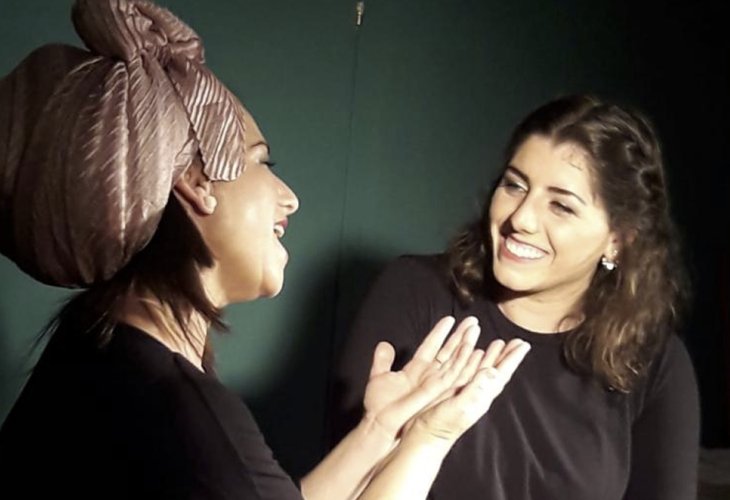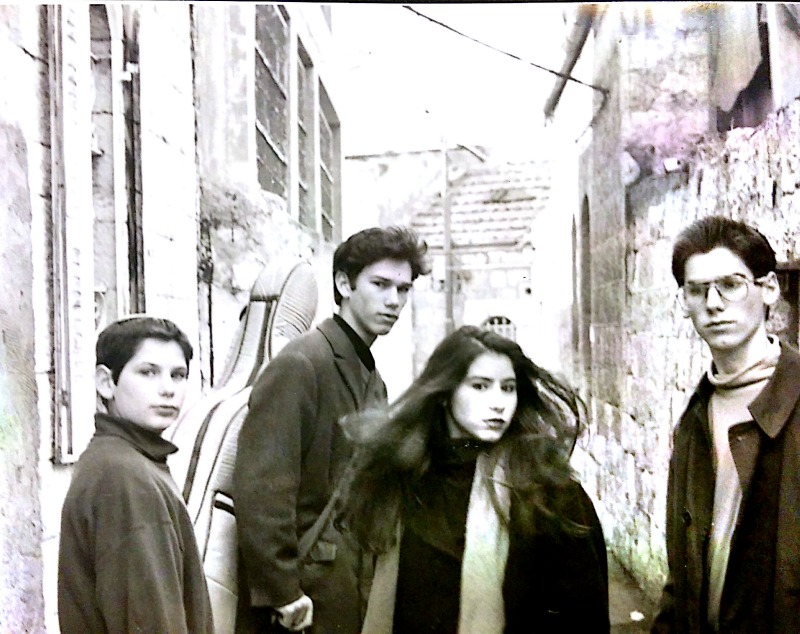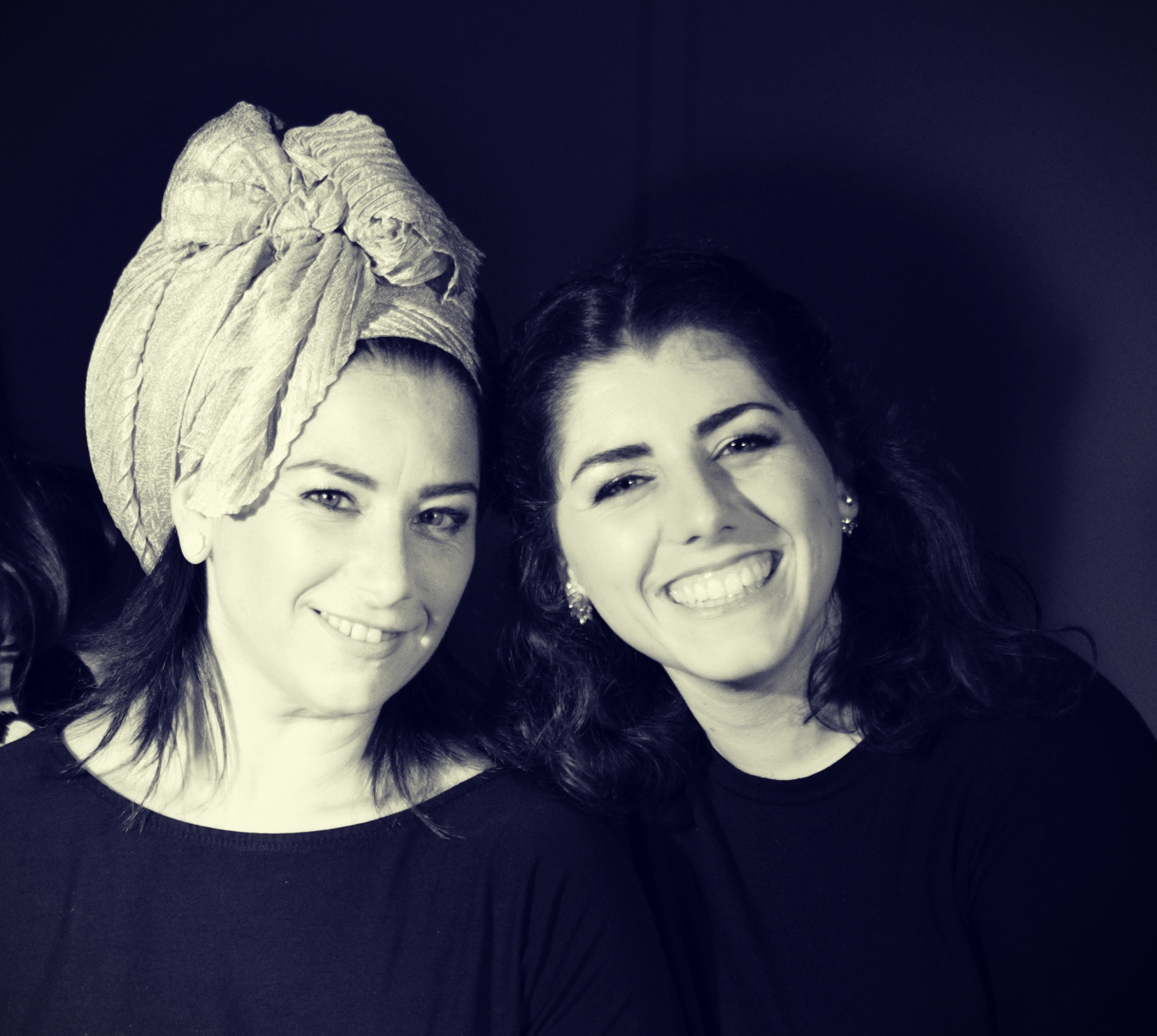Rika Razel: "Many of My Songs Are Influenced by Rebbetzin Yemima"
At 43, a grandmother, engaged in real estate and raising eight children, singer and songwriter Rika Razel releases a debut album. "It wasn’t easy to stand aside and watch my brothers perform while I stayed out," she admits.
 Michal and Rika (personal photograph)
Michal and Rika (personal photograph)"Working with my eldest daughter, Michal, is a huge joy," boasts singer and songwriter Rika Razel, "She is a wonderful child. Of course, there are conflicts between mothers and daughters - and that's what the song is about." In the song she released ('All Out of Love'), Rika wanted to convey a message about parenting, the connection between parents and children, and their complex relationships. "I wanted to write a song that expresses the influence parents have on their children and vice versa," she shares, "Perhaps this is also part of my own maturation process, now that I'm 43. Chami Levi An-Lavan, a child psychologist, once told me that it doesn't matter what parents do, as long as everything is done with love - it will be fine. Most importantly, kids should know we love them and always want their good."
Rika and her husband Yoni live in the Nahlaot neighborhood of Jerusalem, an area rich with memories from her childhood, narrow alleys, and ancient houses. Together they raise eight children: "As a mother, your kids always touch you at a personal level. I have a different connection with each one, experiencing their growth uniquely. I try to allow each child to follow their own path. Michal, the eldest, was always a smooth relationship. My other two teenage daughters are more typical adolescents, each pushing and testing boundaries, wanting to break through. We handle it beautifully, giving each their space, yet maintaining boundaries, guidance, and framework."
"It Wasn’t Easy to Stand Aside"
Working with her eldest daughter, 22, reminds Rika of the days she performed with her older brothers, the creators Yonatan and Aharon Razel. The three grew up in a musical home, and today Yonatan and Aharon's work is an integral part of the Israeli music scene. In their youth, Rika was the lead singer of 'The Razel Family' band, a group founded by the three siblings, performing on different stages, both in Israel and abroad. Over time, the family grew more religious, and when her brothers performed at family events, Rika no longer sang alongside them, "The last time I sang with my brothers might have been about twenty years ago," she shares, "Once, we performed together at every family event, TV shows, and tours abroad, but it’s been a long time since. I was the singer and played the flute in the band, and then everything stopped. The band broke up because Yonatan went to the army, and without him, it wasn’t so 'cool' for us younger siblings to perform together."
 Rika with her brothers in 'The Razel Family' band. Can you spot Aharon and Yonatan? (Photo: Yohai Smet)
Rika with her brothers in 'The Razel Family' band. Can you spot Aharon and Yonatan? (Photo: Yohai Smet)Rika admires her brothers and praises their musical career: "I'm very proud they are influential musicians. I'm their biggest fan and make it a point to attend their performances. Yonatan is the eldest, and there's a year difference between Aharon and me, so we grew up together and were close. Not a day goes by without someone stopping me on the street to ask about them." Rika admits it was hard for her not to sing alongside them: "It wasn't easy to stand aside and see my brothers perform and celebrate while I stayed out. It was tough not singing for many years, but it was probably because I didn't feel I was at the right place. It wasn't the time. In a process of self-growth, I decided to find my way to fulfill my dream. Honestly, it’s also a function of time. Fifteen to twenty years ago, there were fewer opportunities to perform for women. Today it's different, with a broader spectrum, so I could find my place."
"I Was Shocked by the Storm"
About a year ago, Yonatan, her brother, covered his eyes with a piece of masking tape during a performance for a women's audience at the International Convention Center in Jerusalem. This action caused a media storm. A day later, Rika’s debut single "Perfectly Right" was released, marking her return to the spotlight. Commenting on the masking tape incident, she says: "The storm highlighted for me the gap between the religious and secular worlds. I was a bit shocked. Yonatan wanted to do what was best and right, to allow the women attending who were observant a place to dance comfortably and freely. When he covered his eyes, it was out of respect for their choice. But it was taken out of context and interpreted completely differently. I very much hope the communication between the sectors becomes healthier and more inclusive so that the divide doesn't deepen. That’s precisely what I aim to do through my music: build a bridge between the worlds, particularly because I’ve lived in both realms."
Rika married at 19, and by 34, she was already a mother of eight. The need to make a living led her to real estate, and today she owns a real estate brokerage. Additionally, she serves on the management board of the community administration in the heart of the city. Alongside work and raising children, she maintained a continual dialogue with music but stored her writings away. Her musical style was influenced by her brothers and artists like Hanan Ben Ari, Idan Raichel, 'The Sixteenth Lamb', classical music, and the Beatles. In her 40s, she decided the dream to create music and perform was too powerful to ignore and chose to perform within frameworks permissible by halacha. Until then, the only one who heard her creations was her husband, Yoni. "He’s an amazing person, a supportive husband. Honestly, it's all thanks to him; he pushed me to create, and he’s thrilled for me. He loves that I can influence and strengthen women through music. The truth is, he’s more excited than I am."
Choosing to sing only for women presented a significant challenge, "At first, I wrestled with this question; it wasn't simple. As children, we never heard a woman's voice, it wasn't in our lexicon. Finally, I decided to perform only for women, as it’s the most fitting place for me. We follow the halacha."
 Michal and Rika (Photo: Reuven Hayon)
Michal and Rika (Photo: Reuven Hayon)Performing just for women offers something different, empowering and enriching, she says, while also acknowledging challenges, "Most events aren't geared solely towards women, and at times it limits me because I can't participate in concerts. There are also responses like: 'It's primitive; it's passé.' Listening to this isn't always pleasant; one needs to be strong to withstand it. Nevertheless, performing for women brings a completely different energy; it's simply amazing. You come simply to the show. The female audience is very supportive, especially the religious women's audience. It's a very loving audience; they are truly there for you. It’s a different energy. The admiration of the religious audience for artists comes from a genuine place of value-based influence, a calm, correct, and genuine place. The artist is there to have an impact, to strengthen, to dance, and to bring joy—it's not about 'Look how amazing I am.' I wish for myself to be a vessel to spread positive messages and to move. I feel at home on stage; it’s a dream come true to return to singing, creating, and engaging in this daily endeavor. Through music, I undergo an internal journey."
One of the figures in the world of Judaism Rika is connected to is Rebbetzin Yemima Mizrachi: "I know her from Nahlaot, from 20 years ago, when she began giving lessons to a few women in her home. She's a model to me; many of my songs are influenced by her lessons and her messages about the importance of joy, optimism, and action. She's a noble woman, and I’ve always liked seeing her. She radiates strength and optimism, and to me, she's a wonder woman. She's a large family woman, career-driven, serious, wise, and kind. She's a model for me."
Recently, she became a grandmother after her second son, Ohad, married and had a baby girl. "It's delightful," Rika laughs, "as they say—children are like a lollipop on a stick, but grandchildren are just the lollipop; it’s all the sweetness." And how is the balance between motherhood, work, and musical creation? "I think it’s a part of us women," she laughs, "we know how to maneuver between career, motherhood, and self-fulfillment. A woman is multitasking. I became a mother at 19, and by 34, we already had eight children. I entered real estate to support the family while integrating motherhood. I have an innate drive; I need to be active. I've always admired mothers who are completely devoted to their children, who can be available only for them, and their needs. I admit I can't. Since I didn't sing for many years, I faced comments like: 'You experienced silencing.' It's the opposite of the opposite. Jewish women have the most important role—to bring light to the world. Today, religious women work hard and make an effort. They raise families, are privileged to bring life to the world, but they don’t receive the proper credit. What's important is that they know it's the most significant thing, giving the greatest satisfaction."

